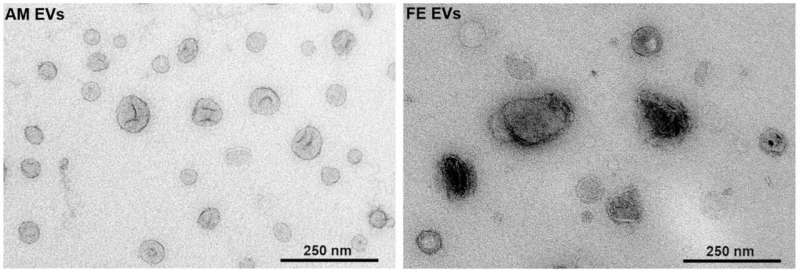This article has been reviewed according to Science X's editorial process and policies. Editors have highlighted the following attributes while ensuring the content's credibility:
fact-checked
peer-reviewed publication
trusted source
proofread
Researchers identify new mechanism of communication between maternal gut bacteria and the fetus

A research group from the University of Oulu, Finland, has shown that nanoparticles originating from maternal gut bacteria are present in amniotic fluid. This is a previously unknown mechanism of communication between the maternal gut microbiome and the fetus.
The detected nanoparticles are extracellular vesicles secreted by cells. The vesicles secreted by bacteria contain molecules derived from cells, such as proteins, DNA, RNA, and metabolic products. These nanoparticles play an important role in bacterial communication.
The research was published in Microbiome under the title "Maternal microbiota communicates with the fetus through microbiota-derived extracellular vesicles."
The study involved 25 mothers who gave birth by Cesarean section at Oulu University Hospital. The study found that the nanoparticles found in amniotic fluid and maternal feces were similar in terms of bacterial species and content. The study was refined in an experimental animal model, where it was found that extracellular vesicles isolated from human maternal feces migrate to the fetus.
The recent research results may provide an answer to the question that has long puzzled the scientific community: whether a healthy fetus is exposed to bacteria during pregnancy and whether the fetal environment has its own microbiota.
"According to our study, in healthy pregnancy, nanoparticles secreted by maternal gut bacteria migrate to the amniotic fluid, containing molecules derived from bacteria. The vesicles do not cause infections like whole bacteria. Thus, the fetus safely becomes acquainted with the mother's normal gut microbes before birth. The mechanism we have found is likely to play a significant role in the development of the fetal immune system during pregnancy," says doctoral researcher Anna Kaisanlahti from the University of Oulu.
The nanoparticles produced by maternal gut bacteria may be important for the development of the fetal immune system. They may safely prepare the fetus for the moment of birth, when the fetal intestine quickly acquires its own microbiota. The finding opens doors for further research. "It would be interesting to study how the communication between the maternal gut bacteria and the fetus during pregnancy affects the child's health later in life," Kaisanlahti reflects.
The research was conducted at the Faculty of Medicine of the University of Oulu and Biocenter Oulu by the research groups of Professor Terhi Tapiainen and Docent Justus Reunanen in collaboration with researchers from Oulu University Hospital, the University of Turku and the Kiel University, Germany
More information: Anna Kaisanlahti et al, Maternal microbiota communicates with the fetus through microbiota-derived extracellular vesicles, Microbiome (2023). DOI: 10.1186/s40168-023-01694-9




















